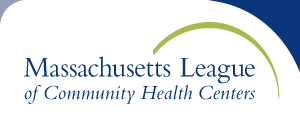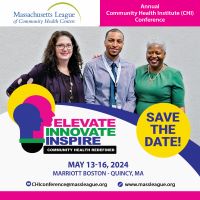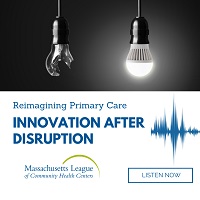Freedom Summer Celebration Virtual Open House
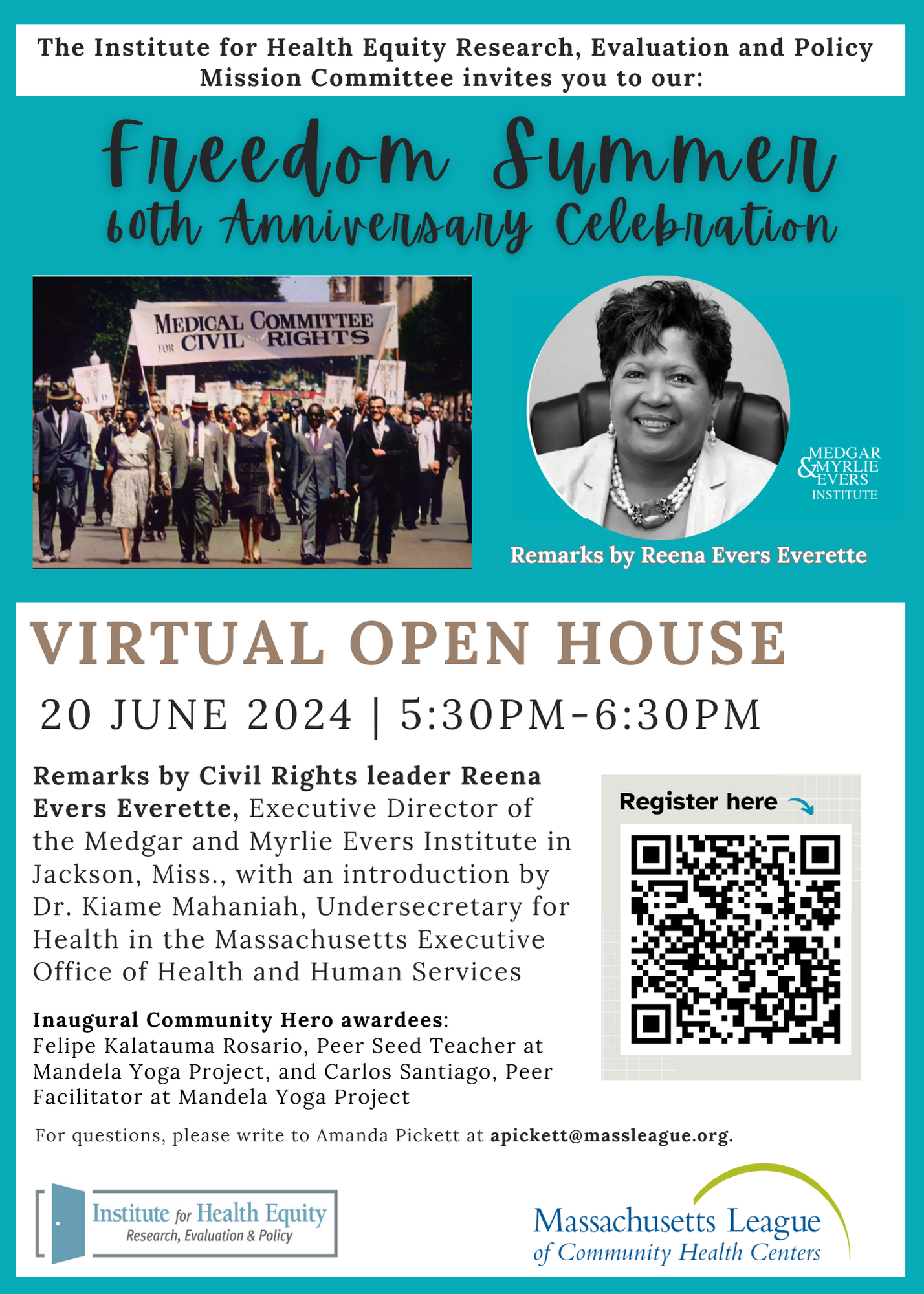
6/20/2024 5:30pm ET - 6:30pm ET with networking time until 7pm ET
Hosted by: The Mission Committee of The Institute for Health Equity Research, Evaluation, and Policy
Remarks by Civil Rights leader Reena Evers Everette, Executive Director of the Medgar and Myrlie Evers Institute in Jackson, Miss., with an introduction by Dr. Kiame Mahaniah, Undersecretary for Health in the Massachusetts Executive Office of Health and Human Services.
Inaugural Community Hero awardees: Felipe Kalatauma Rosario, Peer Seed Teacher at Mandela Yoga Project, and Carlos Santiago, Peer Facilitator at Mandela Yoga Project.
Please note: this meeting will be recorded. For questions, please write to Amanda Pickett at apickett@massleague.org.
Register online:
https://massleague.zoom.us/meeting/register/tZYpd-6gqDgtGtNyoA8GD7W7FqA4cbZsI9Ba
Leadership in Health Equity: May 2024

As Mental Health Awareness Month, May is a time to raise awareness of and reduce the stigma surrounding behavioral health issues, as well as highlight the ways mental illness and addiction can affect all of us - patients, providers, families, and our society at large.
In honor of Mental Health Awareness Month, Dr. Cheryl Clark, executive director and senior vice president of IHE, interviewed Mimi Gardner, vice president and chief equity officer at East Boston Neighborhood Health Center (EBNHC), soon to be called NeighborHealth.
The interview explored Mimi Gardner's experiences at EBNHC, the critical role of mental health services in healthcare, and her recommendations for building a more equitable future for behavioral health.
You can read the full discussion below.
Mental Health Awareness Month: An Interview with Mimi Gardner
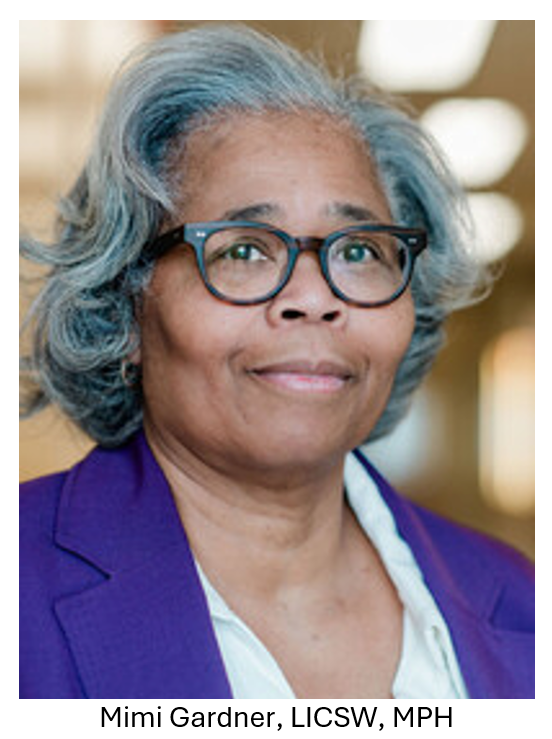
IHE: How is East Boston Neighborhood Health Center addressing the growing need for mental health services in the surrounding communities?
MG: In Latino, immigrant, and non-English speaking populations, individuals often face multifaceted challenges rooted in systemic barriers, cultural differences, and limited access to resources. These challenges can significantly impact mental and behavioral well-being. East Boston Neighborhood Health Center (EBNHC) believes in care that goes beyond the clinic to address drivers of health that impact wellbeing in addition to providing a full array of mental and behavioral health services across the care continuum. Our patient centered care model is committed to supporting our patients' complex needs both in and out of the exam room.
As innovators in healthcare, EBNHC has recently created the first of its kind BH Urgent Care Service, co-located with our Emergency Department and Primary Care services with the capability to see patients in crisis the same day for triage, evaluation, treatment, and referral. Co-locating these services provides seamless transitions of care as acuity shifts, providing a better care experience for our patients. Shifting care from high-cost inpatient and hospital-based emergency services to community-based locations will decrease cost and has shown us to have better clinical outcomes.
IHE: In your experience, what are the biggest barriers for patients accessing mental health services at community health centers in Massachusetts?
MG: There are many systematic and cultural factors hindering patient access to mental health services within Massachusetts community health centers.
At EBNHC, we serve the largest population of Latino primary care patients, 85% of whom are below the federal poverty level and 27% are uninsured. We see how access to health insurance, financial constraints, and difficulty navigating a complex US health care system can contribute to barriers to care.
Cultural impediments such as inadequate availability of culturally responsive treatments tailored to individual needs and cultural backgrounds, as well as a shortage of mental health providers from diverse racial backgrounds entail stigma prevalent in marginalized communities. A reliance on trusted community and spiritual leaders, potentially deterring individuals from seeking evidence-based care from less familiar or trusted providers can also be a factor.
IHE: What are the biggest disparities you see in access to mental health care for different populations within your community? (e.g., racial/ethnic minorities, LGBTQ+ individuals, low-income families)
MG: Racial/ethnic, gender and sexual minorities often suffer from poor mental health outcomes due to multiple factors, including inaccessibility of high-quality mental health care services, cultural stigma surrounding mental health care, discrimination, and lack of awareness about mental health. The mental health system is often not readily accessible, culturally responsive, or a reliable source of effective interventions for society's most vulnerable populations. The strategy to reduce this inequity is to incorporate the perspectives of mental health consumers and their families into care planning and delivery.
IHE: What inspires you or gives you hope for your work to improve mental health in community health centers?
MG: What inspires me is the vision of a future where everyone has equal opportunities to attain optimal mental health and emotional well-being. This journey begins by confronting the stigma within our communities and stepping out of our comfort zones. It involves actively engaging with communities, sharing knowledge, and providing accessible resources where they are needed most. This commitment to outreach and education instills hope that we can make meaningful strides towards mental health equity in community health centers.
IHE: What is your vision for ensuring equitable access to quality mental health care for all members of the East Boston community?
MG: Our vision is to lead transformative community interventions that champion mental health and social equity. Through strategic multi-sector partnerships and a commitment to community-driven service delivery, we aspire to address mental health disparities by leveraging cross-sector collaborations. At EBNHC, we envision a future where our collaborative efforts enhance the physical, built, and social environments, fostering trust and engagement among community members. By prioritizing social well-being and investing in community resources, we aim to create a more equitable society, where individuals thrive within a supportive and inclusive environment.
In 2023, The Massachusetts League of Community Health Centers (Mass League) created the Institute for Health Equity Research, Evaluation and Policy, Inc. (IHE), a 501(c)(3) non-profit organization designed to support Emancipatory research driven by community health centers.
Our mission is to promote and engage in community driven research, evaluation, and public policy to achieve health equality equity.
IHE convenes communities and supports the scientific infrastructure, implementation, program evaluation and training needed to identify and sustain the most effective strategies for attaining equity in health and healthcare, as defined by those with lived experience of health inequities.
Learn more about IHE on our webpage of the Mass League website and on our LinkedIn page.
